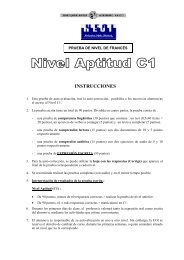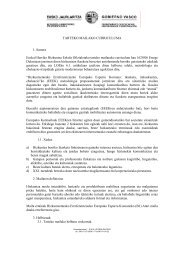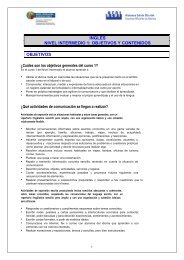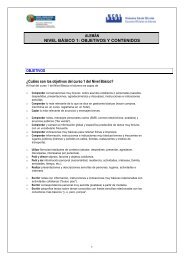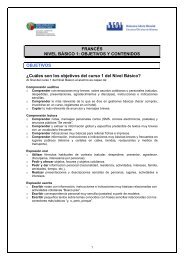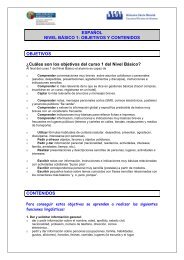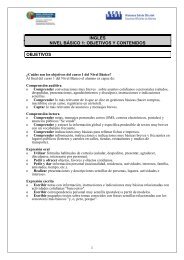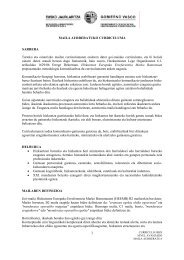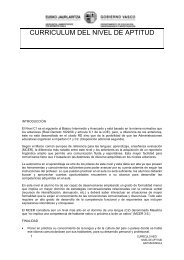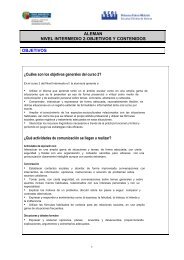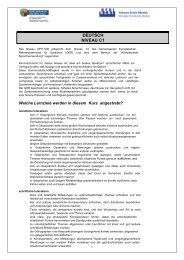C1 – Course Syllabus - Escuelas Oficiales de Idiomas del País Vasco
C1 – Course Syllabus - Escuelas Oficiales de Idiomas del País Vasco
C1 – Course Syllabus - Escuelas Oficiales de Idiomas del País Vasco
Create successful ePaper yourself
Turn your PDF publications into a flip-book with our unique Google optimized e-Paper software.
Personal letters<br />
Broadcasts and<br />
recordings<br />
spoken texts<br />
Contracts<br />
Menus<br />
Sacred texts.<br />
sermons, hymns<br />
15<br />
packaging<br />
Job <strong>de</strong>scription<br />
Sign posting<br />
Visiting cards<br />
5. SKILLS TO BE DEVELOPED TO PERFORM COMMUNICATIVE ACTIVITIES<br />
5.1 Pragmatic competence: functional and discursive<br />
Abstracts<br />
Dictionaries<br />
Pragmatic competence is concerned with the internal representations, mechanisms and<br />
capacities which can be consi<strong>de</strong>red to account for observable behaviour and performance in<br />
the functional use of linguistic resources (language functions, speech acts, discourse structure,<br />
cohesion and coherence, and the i<strong>de</strong>ntification of text types and forms).<br />
5.1.1 Oral and written interaction<br />
Stu<strong>de</strong>nts can learn how and when to initiate or take part in a conversation with native speakers,<br />
expressing their i<strong>de</strong>as and opinions clearly and precisely, contributing effectively to the<br />
<strong>de</strong>velopment of the topic and helping to bring the interaction to a satisfactory conclusion.<br />
In written interaction, stu<strong>de</strong>nts will learn how and when to write clear, well-structured and<br />
appropriate texts on a wi<strong>de</strong> range of complex topics in the form of messages, correspon<strong>de</strong>nce,<br />
summaries, e-mails etc.<br />
5.1.2 Oral comprehension<br />
Stu<strong>de</strong>nts can learn how to cope effectively with un<strong>de</strong>rstanding a wi<strong>de</strong> range of native speakers‟<br />
discourse both live and on various media, which may inclu<strong>de</strong> idiomatic expressions,<br />
colloquialisms and some slang and be able to i<strong>de</strong>ntify explicit as well as implicit meanings even<br />
when the sound quality is not perfect.<br />
5.1.3 Reading comprehension<br />
Stu<strong>de</strong>nts can learn how to un<strong>de</strong>rstand long, <strong>de</strong>manding texts like press articles, reports,<br />
instruction manuals, commentaries, correspon<strong>de</strong>nce and literary texts with the occasional use<br />
of a dictionary and be able to <strong>de</strong>tect implicit meaning as well as summarise their contents.<br />
5.1.4 Oral expression<br />
Stu<strong>de</strong>nts can learn how to express themselves fluently on a wi<strong>de</strong> range of complex subjects,<br />
<strong>de</strong>veloping points and drawing conclusions, giving <strong>de</strong>tailed accounts or <strong>de</strong>scriptions,<br />
<strong>de</strong>monstrating a good command of extensive vocabulary and grammatical accuracy in formal or<br />
informal settings, (e.g. giving a presentation, giving instructions or telling a story).<br />
5.1.5 Written expression<br />
Stu<strong>de</strong>nts can learn how to compose well-structured texts on a wi<strong>de</strong> range of topics, combining<br />
information from diverse sources, including <strong>de</strong>tailed <strong>de</strong>scriptions of feelings, experiences and<br />
events, expressing personal opinions and using stylistically appropriate language.



